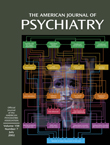Serum Nerve Growth Factor Concentration and Its Role in the Preclinical Stage of Dementia
Abstract
OBJECTIVE: Nerve growth factor is important for the development and function of the cholinergic basal forebrain. The authors examined the hypothesis that the concentration of nerve growth factor is lower than normal in the preclinical phase of neurodegenerative dementia, especially Alzheimer’s disease. METHOD: The serum nerve growth factor concentration of subjects from the Berlin Aging Study and the Berlin Memory Clinic who later developed Alzheimer’s disease were compared with those of subjects who were free of dementia and subjects who were already suffering from Alzheimer’s disease. RESULTS: There were 17 subjects in each group, matched for age and sex. The three groups differed in log-10-transformed mean nerve growth factor concentrations: 1.62 (SD=0.59) for the healthy comparison subjects, 0.92 (SD=0.30) for the subjects with preclinical dementia, and 1.44 (SD=0.61) for the subjects with Alzheimer’s disease. CONCLUSIONS: These results support the hypothesis of disturbed nerve growth factor regulation in the serum of patients with preclinical Alzheimer’s disease. Mechanisms by which these disturbances appear are unclear, but they may reflect the situation in the preclinical Alzheimer’s disease brain.



